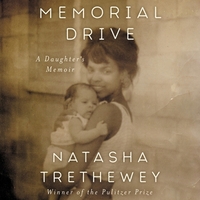Take a photo of a barcode or cover
A beautiful beautiful book. Written well, it explores human relationships, and devastation
Memoir by poet laureate Natasha Trethewey on growing up biracial + domestic violence.
While I appreciated the author's writing, Memorial Drive was not the right book for me right now. It was just too sad. Natasha Trethewey relates the story of her life until her mother's murder when Natasha was 19 years old.
After her idealistic, interracial marriage disintegrates, Gwen moves, with her young daughter, from her native Mississippi to Atlanta to further her education and career. Although she achieves recognition in her career, her second marriage to Joel is one of abuse. The marriage, which took place, along with the birth of her brother, while Natasha was with her grandmother in Mississippi for the summer, is an obstacle for the once close mother and daughter. Soon after Gwen finally leaves Joel, he kills her; Natasha is only 19.
The story was compelling; I read it quickly. But it was just so depressing.
"It was as though another group of ancestors, however distant, surrounded me during school, and in their afterglow my classmates and I were insulated from everyday reminders of attitudes held by white people who had left the neighborhood rather than live and send their children to school alongside us." (60)
After her idealistic, interracial marriage disintegrates, Gwen moves, with her young daughter, from her native Mississippi to Atlanta to further her education and career. Although she achieves recognition in her career, her second marriage to Joel is one of abuse. The marriage, which took place, along with the birth of her brother, while Natasha was with her grandmother in Mississippi for the summer, is an obstacle for the once close mother and daughter. Soon after Gwen finally leaves Joel, he kills her; Natasha is only 19.
The story was compelling; I read it quickly. But it was just so depressing.
"It was as though another group of ancestors, however distant, surrounded me during school, and in their afterglow my classmates and I were insulated from everyday reminders of attitudes held by white people who had left the neighborhood rather than live and send their children to school alongside us." (60)
A beautifully written, heartbreaking read and an incredible look at the cost (And failures of law enforcement) of domestic abuse.
I really wanted to like this book. I am an Investigator who has worked violent crimes for 15 years. This book is a horrible case of domestic violence that ended in murder. It does an excellent job at showing the toll DV has on everyone involved (including the children). It also does a great job at showing how insane these monsters can be. The problem with the book is that the opening grabs your attention, but then it drags for a very long time. The most interesting part was the 12-page document her mother wrote. It stays interesting for a little longer, then gets boring again. Don’t get me wrong, I feel for Mrs. Trethewey, but I’m not going to lie, I feel asleep several times reading it and had to fight to not DNF. ⭐️⭐️⭐️
I didn't know that the author is an honored poet until after I read the book and Googled her. She was the US Poet Laureate and won a Pulitzer Prize in 2007. Her writing is deep and thought-provoking. Trethewey describes what it was like growing up in the South with parents of different races. Her mother loved her fiercely, but unwittingly brought a violent man into their life. They did everything they could to escape, but help was impossible to find. It's a very sad story, but I'm sure the author's mother continues to watch over her from heaven and is as proud as any mother would be.
Heartbreaking and well written, but I wish we had gotten more details about the author’s life since the incident and what happened to her brother.
So, I started this book the day after my mother passed. I've been drawn to books about grief, specifically in the context of mothers and daughters. Our situations could not be more dissimilar: I lost my mom to cancer while Trethewey lost her mother to domestic violence. Yet, our shared feelings were so similar: guilt, anger, depression and regret.
I enjoyed her writing, as well. Whenever Trethewey writes about her mother, especially when she describes her mother as she was in old photographs and recordings, she so perfectly captures that veil of bittersweet nostalgia and regret that colors these perceptions. The unseen things you go back and pick up on with your new knowledge of the future. A sadness that may or may not actually be there.
This coloring of history carries on throughout the memoir as she describes her home town, her school experiences and the tragic day when her mother was killed.
Separating myself from her experience, Tretheway describes with chilling detail the danger women face when trying to leave abusive relationships. She does an amazing job showing how dangerous her stepfather was while acknowledging his behavior was the result of severe trauma and mental illness brought on by his participation in the Vietnam War. It's empathic not sympathetic. The police and community resources do take him seriously as a threat; however, all it takes is a minor lapse in oversight in Tretheway's mother's security to end her life.
I may revisit this book in the future when I'm more distant from my own experiences. Perhaps try it in print.
I enjoyed her writing, as well. Whenever Trethewey writes about her mother, especially when she describes her mother as she was in old photographs and recordings, she so perfectly captures that veil of bittersweet nostalgia and regret that colors these perceptions. The unseen things you go back and pick up on with your new knowledge of the future. A sadness that may or may not actually be there.
This coloring of history carries on throughout the memoir as she describes her home town, her school experiences and the tragic day when her mother was killed.
Separating myself from her experience, Tretheway describes with chilling detail the danger women face when trying to leave abusive relationships. She does an amazing job showing how dangerous her stepfather was while acknowledging his behavior was the result of severe trauma and mental illness brought on by his participation in the Vietnam War. It's empathic not sympathetic. The police and community resources do take him seriously as a threat; however, all it takes is a minor lapse in oversight in Tretheway's mother's security to end her life.
I may revisit this book in the future when I'm more distant from my own experiences. Perhaps try it in print.




